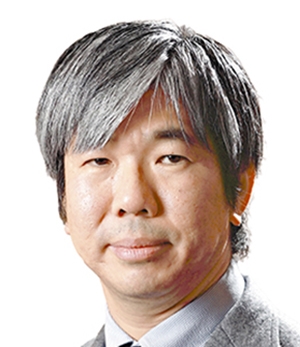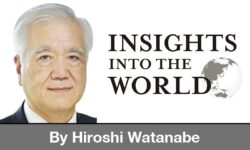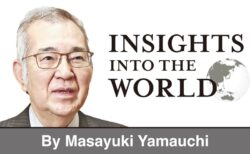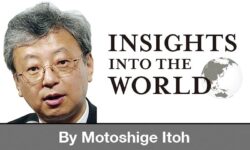11:00 JST, November 29, 2024
“America is not the world’s policeman,” then U.S. President Barack Obama said in 2013.
Now, as then, there are growing concerns about a decline in U.S. global leadership.
The most recent concerns are due to former U.S. President Donald Trump having won reelection to the U.S. presidency in the Nov. 5 election, and his promise to put “America First.”
It should be noted, however, that the United States’ influence in the world began ebbing well before the latest presidential race.
We need to take a broader look at the years since the Obama administration, which have seen a gradual decline in global engagement by the United States. This is the argument that Toshihiro Nakayama, a Keio University professor who passed away in 2022, put forward in his 2023 book in Japanese, titled: “When the Nation of Ideals Groans: Obama, Trump, Biden and the United States.”
What becomes clear when we observe U.S. foreign policy today from a longer historical perspective?
Just as Obama said, the United States no longer seems to be “the world’s policeman.”
Back in World War II, then U.S. President Franklin D. Roosevelt proposed that the United States, Great Britain, the Soviet Union and China maintain the postwar global order as “the four policemen.”
Let us look at what has since happened to these “four policemen.” China has been acting against international rules and laws. For instance, it dismissed as “a piece of wastepaper” a 2016 ruling by the Hague-based Arbitral Tribunal in favor of Manila that was related to a dispute over sovereignty in the South China Sea between the Philippines and China.
Russia — formerly the Soviet Union — invaded Ukraine in February 2022, categorically ignoring international law. As I see it, we are now living in “a world without police.”
The United States, for its part, declined to join the League of Nations prior to FDR’s “four policemen” idea. And the Soviet Union was expelled from the League of Nations in 1939 for invading Finland. As a result, out of FDR’s “four policemen,” the United Kingdom was the only country that remained as a permanent member on the League of Nations’ Council. Britain could not keep the world order from collapsing on its own, and power politics led to World War II.
We can no more trust our safety today to “the four policemen” than people could back then. Nor is international law any longer a self-evidently reliable tool for resolving international disputes.
In its foreign policy in recent years, Japan has sought to ensure a “free and open international order based on the rule of law,” but it is obviously hard for Japan to achieve this goal on its own.
What it means to live in a world without police will become increasingly clear once Trump begins his term in January next year.
When Joe Biden won the 2020 U.S. presidential election as the Democratic Party’s candidate, the late Prof. Nakayama made an incisive comment on the election results. He said, “Even with Trump out [of the White House], Trumpism may be here to stay.”
3 keys to foreign policy
Prof. Nakayama was right. One explanation for Trump’s winning the 2024 presidential election is that an ideology, which we could call Trumpism, spread across the United States over the last four years. Going forward, U.S. foreign policy under the second Trump administration will be shaped by the mixture of three factors: Trumpism, the Republican Party’s unique foreign policy course and traditional U.S. foreign policy thinking.
Trumpism can be described as a mixture of nationalism and populism, which are reflected in Trump’s “America First” approach and his “anti-elitism.” Trumpism has also been linked to criticism of elitism and intellectuals in the United States by Anri Morimoto, president of Tokyo Women’s Christian University. In his Japanese-language book “Anti-Intellectualism: The Religious Roots of America’s Fever,” he presents a detailed picture of such attitudes.
As the United States has chosen to be governed by Trumpism, priority will likely be given to policies that are close to Americans’ daily lives. In contrast, liberal norms such as democracy, human rights and the rule of law will retreat into the background.
As for the GOP’s unique foreign policy course, it has centered around the pursuit of “peace through strength” since the 1980s. The new Trump administration is expected to try to ensure the United States maintains its military superiority in the world and seek to shift the balance of power in favor of the United States and its allies. In contrast to the anti-military ideology of the Democratic Party’s left wing, which seeks to avoid the use of military force, one of the incoming administration’s top priorities is likely to be strengthening the military power by taking advantage of advanced technologies.
And then there is the last factor, the United States’ traditional foreign policy thinking. This goes back to the Monroe Doctrine, which was named after James Monroe, the fifth U.S. president. Under the doctrine, the United States on the one hand pledged not to get involved in the affairs of continental Europe, and on the other hand, asserted that it would protect North and South America from interference.
George Washington, the first president of the United States, avoided the balance-of-power competition in continental Europe. In his inaugural address, Thomas Jefferson, the third U.S. president, pledged that his administration would have “entangling alliances with none.”
Since the United States’ founding, isolationist foreign policy vis-a-vis continental Europe has been an American foreign policy tradition. Its move to distance itself from the war in Ukraine could be described as part of this tradition.
The history of U.S. foreign policy shows that the United States will also strongly confront superpowers antagonistic to it — the United Kingdom during the American Revolution, Germany during the two world wars and the Soviet Union after World War II. If the United States sees China as a threat to its hegemony, it will confront the Chinese.
Japan-U.S. alliance crucial
When all three factors are considered, it becomes clear that since the end of World War II, the United States has followed what is for itself a peculiar foreign policy. This policy has been a major deviation from the tradition of distancing the United States from the Old World’s shrewd balancing of power.
President-elect Trump may intend to revive “normal” foreign policy by keeping a distance from the war in Ukraine.
On the other hand, he is expected to show resolve in continuing to confront China, which will continue countering the United States. In the 21st century, the center stage of world politics has shifted from the Atlantic to the Indo-Pacific. The rivalry between the United States and China for global hegemony — which is central to international politics — will take place in this region.
Just as the United Kingdom was a vital ally for the United States when it was at odds first with Germany and later with the Soviet Union across the Atlantic, so now is the United States’ alliance with Japan crucial for the country.
How, then, should Japan conduct its diplomacy?
It is unclear how U.S. diplomacy will evolve under the second Trump administration. Nonetheless, when we take a broad view of the long history of international relations, it may still be possible to understand what direction the international order will take and the role Japan is expected to play.

Yuichi Hosoya
Yuichi Hosoya is a professor of international politics at Keio University and the author of numerous books on British, European and Japanese politics and foreign affairs, including “Security Politics in Japan: Legislation for a New Security Environment,” and he is the coeditor of “Modern Japan’s Place in World History: From Meiji to Reiwa.”
The original article in Japanese appeared in the Nov. 24 issue of The Yomiuri Shimbun.
Top Articles in Editorial & Columns
-

Riku-Ryu Pair Wins Gold Medal: Their Strong Bond Leads to Major Comeback Victory
-

40 Million Foreign Visitors to Japan: Urgent Measures Should Be Implemented to Tackle Overtourism
-

China Provoked Takaichi into Risky Move of Dissolving House of Representatives, But It’s a Gamble She Just Might Win
-

University of Tokyo Professor Arrested: Serious Lack of Ethical Sense, Failure of Institutional Governance
-

Policy Measures on Foreign Nationals: How Should Stricter Regulations and Coexistence Be Balanced?
JN ACCESS RANKING
-

Japan PM Takaichi’s Cabinet Resigns en Masse
-

Japan Institute to Use Domestic Commercial Optical Lattice Clock to Set Japan Standard Time
-

Israeli Ambassador to Japan Speaks about Japan’s Role in the Reconstruction of Gaza
-

Man Infected with Measles Reportedly Dined at Restaurant in Tokyo Station
-

Videos Plagiarized, Reposted with False Subtitles Claiming ‘Ryukyu Belongs to China’; Anti-China False Information Also Posted in Japan
























